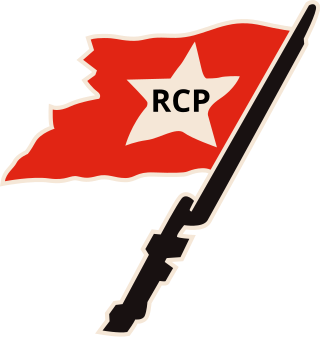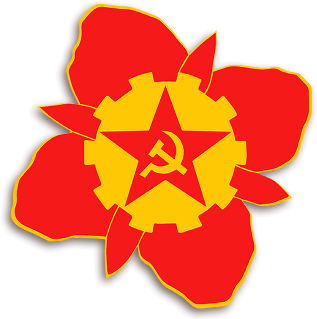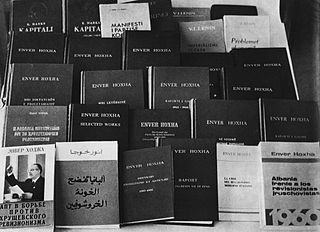Marxism–Leninism is a communist ideology that became the largest faction of the communist movement in the world in the years following the October Revolution. It was the predominant ideology of most communist governments throughout the 20th century. It was developed in Russia by Joseph Stalin and drew on elements of Bolshevism, orthodox Marxism, and Leninism. It was the state ideology of the Soviet Union, Soviet satellite states in the Eastern Bloc, and various countries in the Non-Aligned Movement and Third World during the Cold War, as well as the Communist International after Bolshevization.

The Party of Labour of Albania (PLA), also referred to as the Albanian Workers' Party (AWP), was the ruling and sole legal party of Albania during the communist period (1945–1991). It was founded on 8 November 1941 as the Communist Party of Albania but changed its name in 1948. The party was dissolved on 13 June 1991 and succeeded by the Socialist Party of Albania and the new Communist Party of Albania. For most of its existence, the party was dominated by its First Secretary, Enver Hoxha, who was also the de facto leader of Albania.
The New Communist movement (NCM) was a diverse left-wing political movement during the 1970s and 1980s. The NCM were a movement of the New Left that represented a diverse grouping of Marxist–Leninists and Maoists inspired by Cuban, Chinese, and Vietnamese revolutions. This movement emphasized opposition to racism and sexism, solidarity with oppressed peoples of the third-world, and the establishment of socialism by popular revolution. The movement, according to historian and NCM activist Max Elbaum, had an estimated 10,000 cadre members at its peak influence.

The Workers' Party of Ethiopia was a Marxist–Leninist communist party in Ethiopia from 1984 to 1991 led by General Secretary Mengistu Haile Mariam. The Workers' Party of Ethiopia was founded in 1984 by the Derg, the ruling provisional government of Ethiopia, as the vanguard party for a planned future socialist state. In 1987, the WPE became the ruling party after the establishment of the People's Democratic Republic of Ethiopia, and the only legal political party until it was disbanded in 1991. A party was attempted to be formed with the same name in August 2022, but the application was rejected.

The Democratic People's Movement was the electoral wing of the Marxist-Leninist Communist Party of Ecuador and a political party in Ecuador since 1978.

Chilean Communist Party (Proletarian Action) (Spanish: Partido Comunista Chileno (Acción Proletaria), PC(AP)) is an anti-revisionist Marxist–Leninist communist party in Chile, founded in 1979 and originating from the pro-Albanian tradition. It has presented independent candidates on legislative elections. The General Secretary of PC(AP) is Eduardo Artés.

The Marxist–Leninist Communist Party of Ecuador is an anti-revisionist Marxist–Leninist communist party in Ecuador, founded August 1, 1964, following a split from the Communist Party of Ecuador.
The People's Revolutionary Front (Marxist–Leninist–Maoist) is a Bolivian communist party of the Marxist–Leninist–Maoist orientation. They are ideologically close to the Communist Party of Peru.

The Revolutionary Communist Party, USA is a new communist party in the United States founded in 1975 and led by its chairman, Bob Avakian. The party organizes for a revolution to overthrow the system of capitalism and replace it with a socialist state, with the final aim of world communism. The RCP is frequently described as a cult around Avakian.

The Communist Party of Canada (Marxist–Leninist) is a federal political party in Canada. It was founded in 1970 by Hardial Bains, a staunch Stalinist and anti-revisionist. The CPC(M-L) has been registered with Elections Canada as the Marxist–Leninist Party of Canada (MLPC) since 1974, as the party is prohibited from using the name "Communist Party of Canada" in Canadian elections to avoid confusion among voters. The party is not an offshoot of the Communist Party of Canada; its early membership came from student-led organizations active in the 1960s. After a period of alignment with Maoism and China, the CPC(M-L) pursued a Hoxhaist, pro-Albanian line until the early 1990s. At present, the party directs most of its public support to Cuba and North Korea.
The International Communist Seminar (ICS) was an annual communist conference held in May in Brussels, Belgium. It was organized by the Workers' Party of Belgium (WPB).

A popular front is "any coalition of working-class and middle-class parties", including liberal and social democratic ones, "united for the defense of democratic forms" against "a presumed Fascist assault". More generally, it is "a coalition especially of leftist political parties against a common opponent".

Hoxhaism is a variant of anti-revisionist Marxism–Leninism that developed in the late 1970s due to a split in the anti-revisionist movement, appearing after the ideological dispute between the Chinese Communist Party and the Party of Labour of Albania in 1978. The ideology is named after Enver Hoxha, First Secretary of the Party of Labour from 1941 to 1985 and leader of Albania from 1944 to 1985.

The Communist Party of Great Britain (Marxist–Leninist), abbreviated CPGB-ML, is an anti-revisionist Marxist–Leninist communist party in the United Kingdom, active in England, Scotland, and Wales. The CPGB-ML was created after a split from the Socialist Labour Party (SLP) in 2004. The CPGB-ML publishes the bimonthly newspaper Proletarian, and the Marxist–Leninist journal Lalkar is also closely allied with the party. The party chair is Ella Rule.

The Communist Party of Kenya (CPK), formerly known as the Social Democratic Party (SDP), is a prominent political organisation in Kenya. Founded in 1992, the political party has undergone substantial transformations in its name, ideological orientation from social democracy to communism and political positioning. Throughout its history, the Communist Party of Kenya has faced distinct challenges and played a notable role in Kenya's political evolution.

The Party for Socialism and Liberation (PSL) is a communist party in the United States. PSL was established in 2004, when its members split from the Workers World Party. The group believes that a socialist revolution is necessary to overthrow capitalism and establish socialism. The organization works toward this end by organizing and participating in local protests, running candidates in elections, and political education favoring a revolutionary socialist vanguard party.
Marxism–Leninism–Maoism (MLM) is a political philosophy that synthesizes and builds upon Marxism–Leninism and the thought of Mao Zedong. Marxism–Leninism–Maoism was first formalized by the Shining Path in 1982.
A socialist state, socialist republic, or socialist country, sometimes referred to as a workers' state or workers' republic, is a sovereign state constitutionally dedicated to the establishment of socialism. The term communist state is often used synonymously in the West, specifically when referring to one-party socialist states governed by Marxist–Leninist communist parties, despite these countries being officially socialist states in the process of building socialism and progressing toward a communist society. These countries never describe themselves as communist nor as having implemented a communist society. Additionally, a number of countries that are multi-party capitalist states make references to socialism in their constitutions, in most cases alluding to the building of a socialist society, naming socialism, claiming to be a socialist state, or including the term people's republic or socialist republic in their country's full name, although this does not necessarily reflect the structure and development paths of these countries' political and economic systems. Currently, these countries include Algeria, Bangladesh, Guyana, India, Nepal, Nicaragua, Sri Lanka and Tanzania.
The Group of Popular Combatants is a far-left Marxist–Leninist insurgent movement active in the Republic of Ecuador. It is the armed wing of the Marxist–Leninist Communist Party of Ecuador, a party formed in 1964 as a split from the Communist Party of Ecuador and internationally affiliated with the International Conference of Marxist–Leninist Parties and Organizations. The party belongs to an anti-revisionist tradition of Marxism–Leninism, one originally aligned with Albania during the Cold War and frequently referred to as Hoxhaism.
The government of the Derg consisted of Unitary Marxist-Leninist one-party system with communist and later socialist ideology. Opposing feudal system of Ethiopia, the Derg abolished land tenure in March 1975 and began sweeping land reform under Land Reform Proclamation. All means of goods have been therefore nationalized by the regime including housing, land, farms, and industry.












